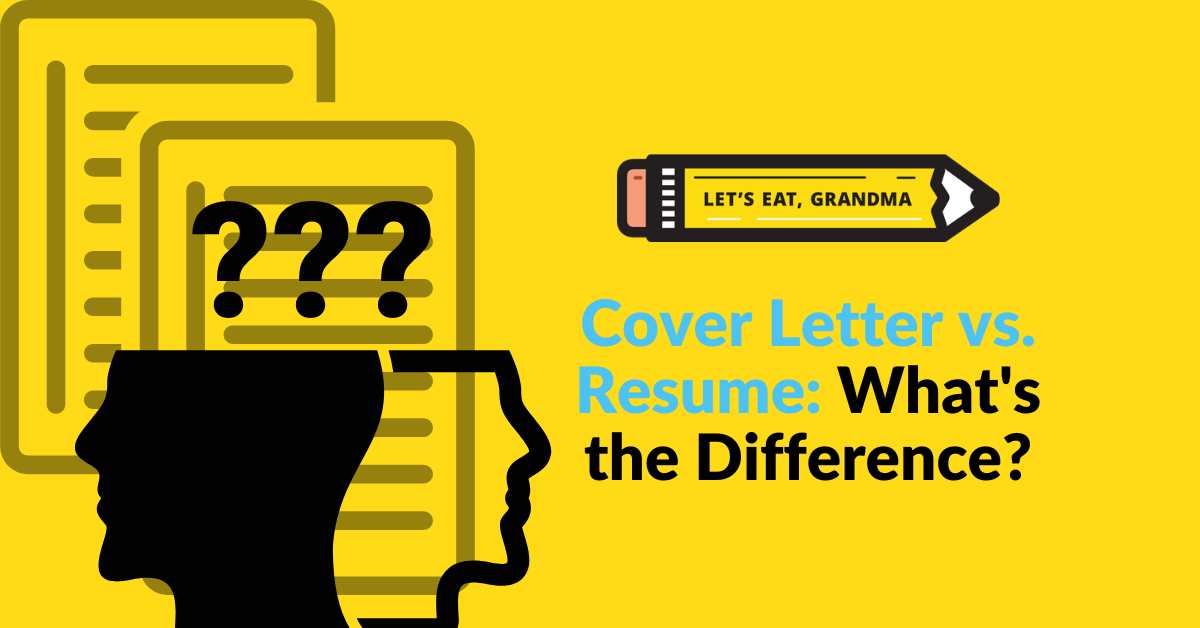Cover Letter vs. Resume: What’s the Difference?

Knowing the key differences between a cover letter vs. a resume can help you write each more effectively. And that will land you more interviews!
By: Grace Mitchell | Contributor for Let’s Eat, Grandma
If you’re confused on the difference between resumes and cover letters, you’re definitely not alone. They’re both asked for so commonly that it can be easy to confuse their purposes and what you should write in each one. Many job seekers get confused by the incorrect idea that that both documents are basically the same.
Ready for more job search help?
Sign up for a free Senior Writer Resume Critique to see what's holding you back from landing interviews. One of our top professional resume writers will give you personalized feedback on the top 3 items you can improve based on our expert practices!
We don’t want anything standing in your way of career success, so Grandma is here to clarify the differences in the purposes, style, and best practices for each of these important documents, based on the knowledge of our team of expert resume writers.
Cover Letter vs. Resume: The Quick Version

“Cover letter vs. resume” is a common Google query. Photo by Arkan Perdana on Unsplash
We know you’ve got jobs to apply for and places to be, so here’s the short version: A resume gives an overview of your relevant skills & accomplishments, while the cover letter supplements those with your personal info and stories.
If you want a point-by-point rundown of the differences, read on!
Cover Letter vs. Resume: The Expanded Version
Part of the confusion between resumes and cover letters stems from the fact that these two documents are often asked for together in applications. Each document should make a positive impression to help you secure an interview. To achieve this goal, the documents use different tactics and complement each other.
A cover letter is written in a first-person and narrative style. It utilizes a few detailed stories instead of many short, fact-focused bullet points. While your recruiter may not pay much mind to your cover letter, this document can be crucially important in helping your hiring manager choose between you and other qualified candidates. Your cover letter is useful for showing how your values match the company’s and addressing potential red flags like a career gap. And it should do all these things in less than one page.
Meanwhile, a resume uses an absent first-person and detached style, as well as many short, fact-focused bullet points. It should be a quick, scannable introduction for both your recruiter and hiring manager that quickly proves you have the skills and experience needed to kick butt at the job. This document focuses on stats rather than full explanations, but it can also be two pages for some job seekers.
Key Features for Each Document
Now let’s break down these differences and how you should use them in each document to land an interview:
Cover Letter Style

A cover letter should be written in first person. Photo by Brett Jordan on Unsplash
Your cover letter should be written in a first-person, narrative style. This is your opportunity to tell your career story to your hiring manager, and why you believe this job is the next best step. While your cover letter should remain professional in its tone, don’t be afraid to use “I” and “we” to bring your career stories to life.
Resume Style
Unlike your cover letter, your resume should be in an absent first-person and detached style. Absent first-person is basically first-person without the pronouns, so instead of saying something like “I coordinated leave options for up to 30 staff at one time,” your bullet point would just say, “Coordinated leave options for up to 30 staff at one time.”
A detached writing style also helps you convey just the facts to your recruiter and hiring manager. Your writing should still engage the reader, but it’s less personal and flowing than in a cover letter.
Cover Letter Structure
A cover letter utilizes paragraph format to deliver a few stories that demonstrate your most impressive and relevant career skills and accomplishments. This is where you dazzle the hiring manager with tales of how you coordinated multiple projects at a time, maintained strong team morale through the worst of the COVID-19 pandemic, or went above and beyond your job duties to help out your manager in a pinch.
A good cover letter will address stories that might be mentioned on your resume, but it never simply restates your resume. Rather, these stories should give more context to the metrics mentioned on your resume to paint a more complete picture of your soft skills.
For instance, say you have an accomplishment on your resume about increasing employee retention by 30% one year. You might explain in your cover letter to explain the background of how the company culture was causing people to quit, and you took initiative (a key skill in the job posting) to design some of your own manager trainings and programs that promoted a more healthy work-life balance.
Cover letters are traditionally written in paragraph format, but you can also incorporate some longer bullet points if that helps you present the information clearly. These can provide natural breaks and allow you to include details that might otherwise make for clunky sentence structure.
Resume Structure
A resume, meanwhile, is primarily composed of short, fact-focused bullet points. This document should be easily scannable and quickly demonstrate your most relevant career highlights. Generally speaking, you’ll want each job in your professional experience to include 3-6 bullet points, depending on how recent and relevant the experience is.
Like your cover letter, your resume can vary its structure somewhat to call the reader’s attention your most relevant skills and experience., An important place where this happens is your summary of qualifications. This important section gives a brief paragraph or bulleted overview of your most significant career accomplishments.
You can (and should) also vary your resume sections depending on your career situation and what’s most important to the particular job. If you’ve recently graduated college, for instance, your education should typically go before your professional experience, while for many other professionals it will probably go at the bottom. Or if you’re changing careers and recently took courses in your new field, your Certifications section might go above Professional Experience to demonstrate that you’ve learned the skills required for the new field.
Cover Letter Audience
Your cover letter should be written primarily with your hiring manager in mind. While many job seekers question the importance of this document, you do still need to write one! Hiring managers weigh cover letters to decide between their final selection of candidates. That means that a brief, well-written cover letter can easily mean the difference between getting an interview and getting passed by.
It is true that some recruiters skip or only skim cover letters, but that makes sense when considering that recruiters are just the initial gatekeepers when it comes to who gets interviews. Their role is to filter out the least qualified applicants and give hiring managers fewer applicants to choose from for their final selection.
Since you’re assuming with your cover letter that a hiring manager is reading it to choose between you and a small number of other candidates, you can showcase more of your personality and individual style than in a resume. Think of it as more of a one-on-one conversation that answers the question, “Why are you the right fit for this job?”
Resume Audience
Your resume, on the other hand, is for both your recruiter and hiring manager. It can be more general and overarching than your cover letter. Don’t worry as much about communicating personality as this is just a brief overview of your recent career.
That being said, your resume should still be tailored to the job description. Pay attention to the values that are important within the organization you’re applying for. For instance, at the library I work at, one of our five core values is equity. In my resume, I was intentional in highlighting my work both working with a diverse team and serving underserved populations.
Cover Letters Serve to Elaborate

A cover letter gives context to your achievements and is also where you can explain any gaps. Photo by Anete Lūsiņa on Unsplash.
Your cover letter is the ideal place to lay out your professional philosophies and values, as well as explain any life factors that aren’t obvious from your resume. This is your space to discuss why you do the work you do and point to your unique leadership styles.
Have a significant career gap or some other “red flag” on your resume? Your cover letter also gives you space to explain anything that’s missing or may come across as odd in your resume. Maybe you took some time off to care for a sick relative or to focus on a personal project that was important to you. Whatever the reason for the gap, it’s entirely possible that you’ll be demonstrating how your own values overlap with that of the company when you describe the gap in your cover letter.
(Sidenote: If your career gap is related to the pandemic, you don’t need to stress. A 2021 survey by the US Bureau of Labor Statistics showed that of those surveyed who weren’t currently working, almost 41% were not working due to the pandemic. Pandemic-related career gaps are incredibly common, and something hiring managers are now very familiar with.)
Resumes Give Just the Facts
Your resume isn’t the place to lay out your motivations or provide explanations for stages in your career journey. You simply don’t have the space on the page! This document is for supplying the facts of the accomplishments you’ve achieved in your career so far, demonstrating that you have the skills for the job you’re applying for.
This can be daunting for job seekers with career gaps, but keep in mind that there are ways to address this on your resume. For example, you could include volunteer experience as professional experience or leave out months on your work history.
Cover Letters Are Less Than One Page
While you can convey a lot of information in your cover letter, keep in mind that this document should only be about 3/4 of a page long, and never over a page! You want your hiring manager to be able to read and absorb all the information in just a few minutes, so think short paragraphs.
Resumes Are (Sometimes) Longer
Depending on how long and relevant your career history is, your resume can be longer than one page. While I personally have never submitted a resume that’s longer than a page, I also only finished college five years ago. I simply don’t have the career history to justify that length. My dad, meanwhile, has spent about 40 years in his industry, and many of those at a supervisor level. It would be impossible for him to highlight his most relevant experience with only one page!
Of course, there are plenty of career stages between five years of experience and over 40. If you’re not sure if one or two pages is right for your resume, Grandma has a handy guide to help you out.
Resumes and Cover Letters: Putting It Together
While these documents vary in their style, structure, audience, and length, they should come together to demonstrate why you’re the best candidate for the job. Keep your resume in mind when writing your cover letter and vice versa, and remember these documents should complement one another rather than repeating information.
Now that we’ve clarified what sets these two crucial documents apart, you can combine them to achieve your career goals! With a well-written, tailored cover letter and resume, you’ll be unstoppable.
Ready for more job search help?
Sign up for a free Senior Writer Resume Critique to see what's holding you back from landing interviews. One of our top professional resume writers will give you personalized feedback on the top 3 items you can improve based on our expert practices!

